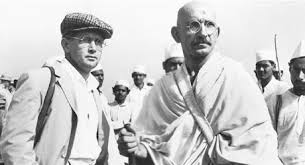
in the film with same name
Since a friend of ours had called us for breakfast we went and we were totally surprised by the presence of some of the cast members in the restaurant. As a young girl I was totally excited to see Ben Kingsley (who was essaying Gandhi), Roshan Seth (who played Nehru), writes RADHIKA RAJAMANI
Being a student of history one had read about Gandhiji’s contribution to the freedom struggle and the nation, his weapons of satyagraha and ahimsa, his clarion call for Swadeshi, crusade against untouchability and his yeomen work in the field of leprosy and much more. Though many had heard about Gandhi through people and read about him in books it was Sir Richard Attenborough who brought the man alive on celluloid through his Oscar-winning film “Gandhi” encapsulating his life from South Africa, his role in the freedom struggle to his death, which is still the most well-known film on the freedom fighter. Sir Richard Attenborough met Smt Indira Gandhi to seek permission to do the film. Convinced by his research on Gandhi and the treatment and approach of the film Smt. Indira Gandhi gave her nod. My late father had the good opportunity to meet Sir Richard and listen to his detailing of the story. The film was shot in different parts of the country highlighting the main and definitive episodes of his life.

Some part of the shooting was held in New Delhi in the early 80s and the cast was staying in Ashoka Hotel. Since a friend of ours had called us for breakfast we went and we were totally surprised by the presence of some of the cast members in the restaurant. As a young girl I was totally excited to see Ben Kingsley (who was essaying Gandhi), Roshan Seth (who played Nehru) and a few others. When one saw the film on the big screen one was overawed by the content and the images. Sir Richard had put his heart and soul in the making of the film. Some of the images are still vivid in memory. “Gandhi” finally swept the Oscars in 1983 with eight Oscars. This film remains a seminal film on Gandhi even today!

Shyam Benegal directed another film titled “The Making of the Mahatma” in 1996 (based on the book “Apprenticeship of the Mahatma” by Fatima Meer, who also wrote the screenplay of the film) which chronicled Gandhiji’s life in South Africa, his barrister days, Tolstoy Farm (his first ashram in South Africa), how this experience shaped him, where he devised the weapon of Satyagraha and led him to India and plunge into the national movement. This eminent filmmaker had a special screening of the film in Hyderabad where Rajat Kapoor (the actor who played Mohandas Karamchand Gandhi), Fatima Meer and Shyam Benegal were present. The screening of the film was followed by an interaction with the audience where I was present. It was indeed a special occasion which I was privileged to be part of.
Shyam Benegal directed another film titled
“The Making of the Mahatma” in 1996 (based on the book “Apprenticeship of the Mahatma” by Fatima Meer
While these were the two main films of Gandhi which showcased his life, there were others like “Hey Ram” (which dealt with the story of two friends from different religious backgrounds in the aftermath of the Partition), “Maine Gandhi ko nahin mara”, “Gandhi, My Father” (which described the relationship of Gandhi and his son Harilal Gandhi based on the book by Harilal) and “Lage Raho Munnabhai” (brought Gandhi to the younger generation) which looked at various aspects of Gandhi’s life.

Short films and documentaries too have been made on the father of the nation. Gandhi figures in many films/biopics like “Mountbatten”, “Jinnah”, “Ambedkar”, “Veer Savarkar”, “Sardar””, “Dear Friend Hitler” and many more!
Albert Einstein said about Gandhi: “Generations to come will scarce believe that such a one as this ever in flesh and blood walked upon this earth.”
This quote by the world-renowned physicist is engraved in Birla House, New Delhi, where Mahatma Gandhi was shot on January, 30, 1948. When I first visited Birla House many years ago and read this quotation I had goosebumps! One hundred and fifty one years after his birth and seventy one years after his death Gandhiji is remembered on October 2, his birthday, and January 30, the day of his martyrdom . It is sad that the father of the Nation is mostly relegated to the annals of history books and to some extent in cinema where the film “Gandhi” is a regular feature on television on October 2!
















